10 Knowledge Repositories

Knowledge repositories help make work information easily accessible to your teams. These platforms allow knowledge creation, storage, organization, collaboration, and more. Let’s look into the best organizational knowledge repositories to help kickstart your team’s self-learning journey.
1. EdApp
EdApp is an all-in-one training software that’s a great option if you’re looking for a knowledge repository. Its course library contains hundreds of courses on different topics that you can edit and customize as you see fit. There are cybersecurity, diversity and inclusion, and administration training courses, among many others, all of which can be accessed by your teams on multiple devices, even on their smartphones. This makes information easy to check when needed. If you want to create a course from scratch, you can do so using EdApp’s template-based authoring tool. Just choose from over 80 intuitively-designed microlearning templates and populate your content, then you’re good to go.
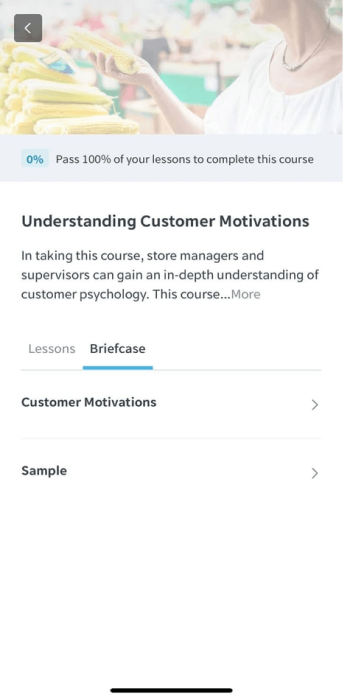
Additionally, EdApp’s Briefcase feature allows you to store all your documents in one place. Here, employees will gain access to policies, procedures, standard practices, how-to videos, and FAQs anytime and anywhere. Along with courses, these can be downloaded for offline use.
Cost: Free
Key features:
- Course library
- Authoring tool
- Briefcase
Sign up for Free and Start Using the Best Knowledge Repository Today!
2. Confluence
If your team uses Atlassian products, then you’ll find Confluence a great complementary knowledge repository for your team. Here, you can create, collaborate, and organize all types of knowledge in one place. You can take advantage of the spaces feature, which is a collection of related pages that you can collaborate on. You can also set permissions, such as editing and viewing access. This helps keep things organized and information easily accessible by the right people. Since it’s an Atlassian product, it integrates seamlessly with other software like Jira and Trello.
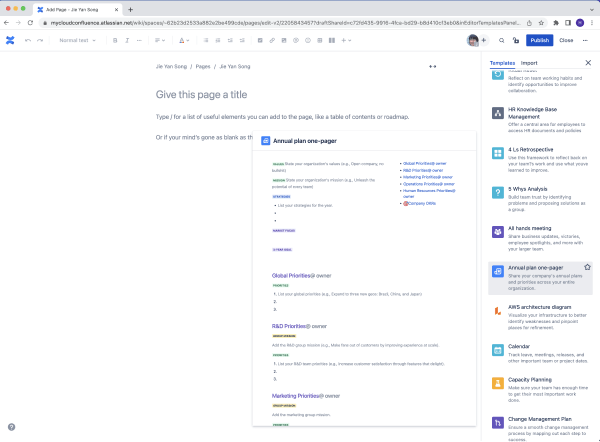
Cost: Free, Paid plans (starts at 5.75 USD)
Key features:
- Spaces
- Permission setting
3. Helpjuice
Helpjuice was created from the ground up to help improve team collaboration. It’s a popular choice for most companies thanks to its easy content authoring and formatting features. Helpjuice’s authoring tool allows users to create company documents, publish different article versions, and collaborate with others in real-time. To make sorting documents and articles easier, you can create categories and folders to structure content.
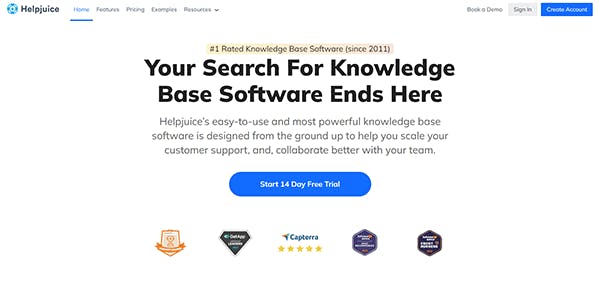
Cost: Starts at 120 USD
Key features:
- Content authoring
- Authoring tool
- Categories and folders
4. Nuclino
Nuclino is another knowledge repository that can help you store and share organizational knowledge with your team. It has an easy-to-use authoring tool where users can simply drag and drop content. This can include text, images, videos, files, tasks, embeds, code blocks, and more. Other users can jump in to collaborate, and any changes will be displayed in real-time. Nuclino also integrates with other apps that you might already be using, such as Dropbox, Slack, and Miro.
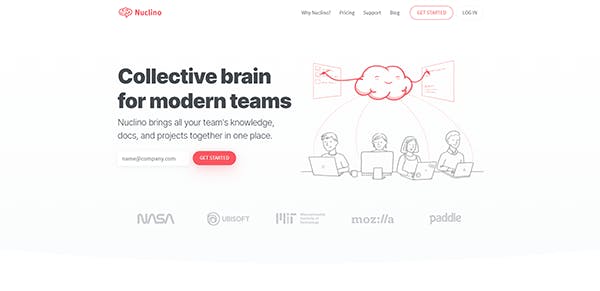
Cost: Free, Paid plans (5 USD/user/month)
Key features:
- Authoring tool
- Multiple file formats
- App integration
5. Guru
Guru is a wiki-type knowledge repository that uses a simple but powerful editor to create and import content without any distractions. You can organize content through collections, boards, groups, and cards so relevant information is accessible to users who need it. Another feature users can find handy is its browser extension, making checking information possible from anywhere on the web. Guru also had a duplicate detection feature, which keeps things clean and reduces the need to manually locate the same content.

Cost: Free, Paid plans (5 USD/user/month)
Key features:
- Simple editor
- Content organization
- Browser extension
6. Trainual
Trainual helps you keep track of your processes by letting you create your own business playbook. Here, you can turn procedural knowledge and SOPs into step-by-step manuals with just a few clicks and transform boring policies into bite-sized learning. Simply record your screen, then embed your files, such as images, GIFs, and videos, and you’re good to go. There are also available templates that you can use or get inspiration from. You can then organize content into folders called Collections, which can be based on department, team, location, and more.
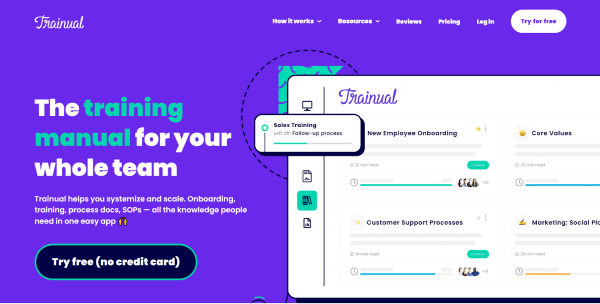
Cost: 49 USD/month
Key features:
- Collections
- Screen recording
- Templates
7. Bloomfire
Bloomfire is another knowledge repository that you might want to consider. Through its rich text editor, you can create content of any topics, whether it’s about facility management, cybersecurity, sales strategies, or administration training courses. Work on whatever format you like – add text, charts, images, audio, and video, it’s up to you. It also features an AI-powered search engine that deep indexes every word in your documents. Bloomfire even transcribes spoken words in videos so you can jump to the exact point where they were. It also has a feedback loop that encourages users to share feedback about the content, identify gaps, and improve knowledge sharing.

Cost: Starts at 25 USD
Key features:
- AI-powered search
- Rich text editor
- Video transcription
8. Document360
If you want to create a self-service knowledge repository for your teams, then Document360 is a tool that you should consider. It has two editors that you can use depending on your needs. The Markdown editor is for text and code-heavy documents, while the WYSIWYG editor is a Word-like familiar editor. To house your knowledge base and organize content, you can create a home page just by dragging and dropping content. Document360 is cloud-based, SSO compatible and uses SSL encryption, so you know your files are secure.
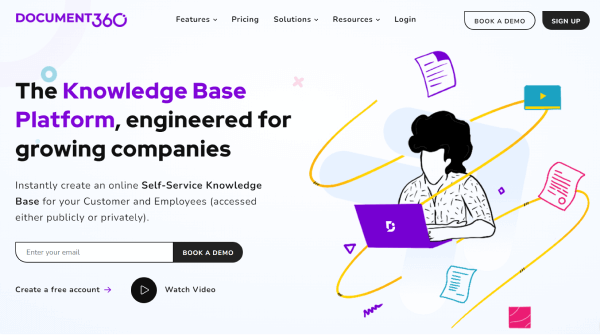
Cost: 99 USD
Key features:
- Markdown and WYSIWYG editor
- Home page
- SSL encryption
9. Knowmax
Knowmax is a knowledge management platform, which also makes it perfect as a knowledge repository. Here, you can create all sorts of documentation, such as decision trees, how-to guides, articles, and FAQs. If you need to find a file, you’ll find Knowmax’s semantic search feature very helpful since you don’t have to remember the location of where you saved information. Like other knowledge repositories, you can choose who to give access to, such as by department or on an individual basis.
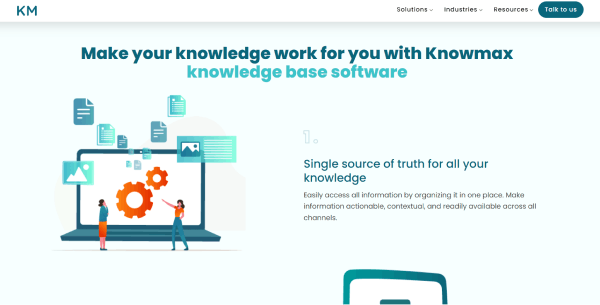
Cost: Available upon request
Key features:
- Multiple documentation types
- Semantic search
- Access permissions
10. Slite
Slite is also a great platform for building and storing learning materials of any topic, from marketing to administration training courses, as well as leadership, diversity and inclusion, and sensitivity courses. With its easy-to-use drag-and-drop editor and other key features, such as inline comments and collaborative cursors, you can quickly create a training course and get started collaborating with your team.
There are ready-made templates that you can use, so you don’t have to start from scratch. You can even import documents from other platforms, such as Confluence, Guru, Notion, and more. You can use Slite for free with an unlimited number of members but with a limited number of documents.

Cost: Free, Paid plans (starts at 6.67 USD/month)
Key features:
- Drag and drop editor
- Ready-made templates
- Document import
Author
Gabrielle Rivera
Gabrielle is an eLearning content writer for EdApp, a microlearning solution designed for today's digital habits. She creates content about cutting-edge learning technologies and resources to help companies deliver great training experiences. When not absorbed in writing, she spends her time playing video games and reading books.
